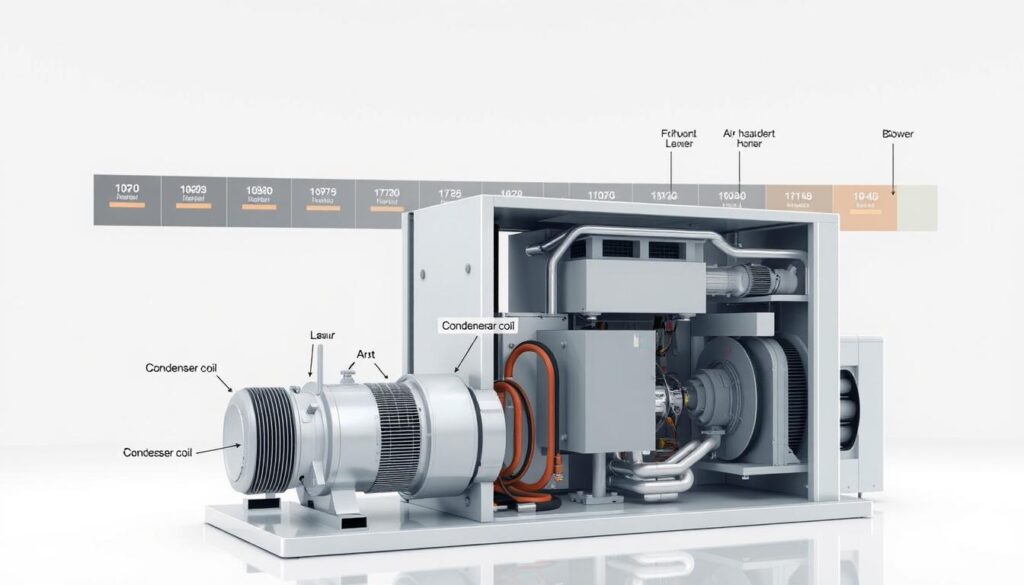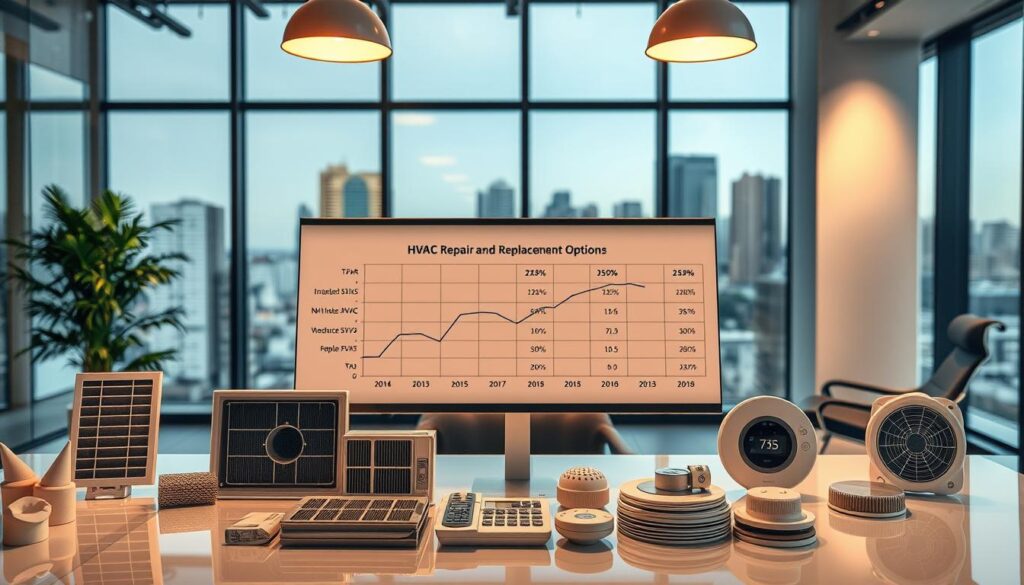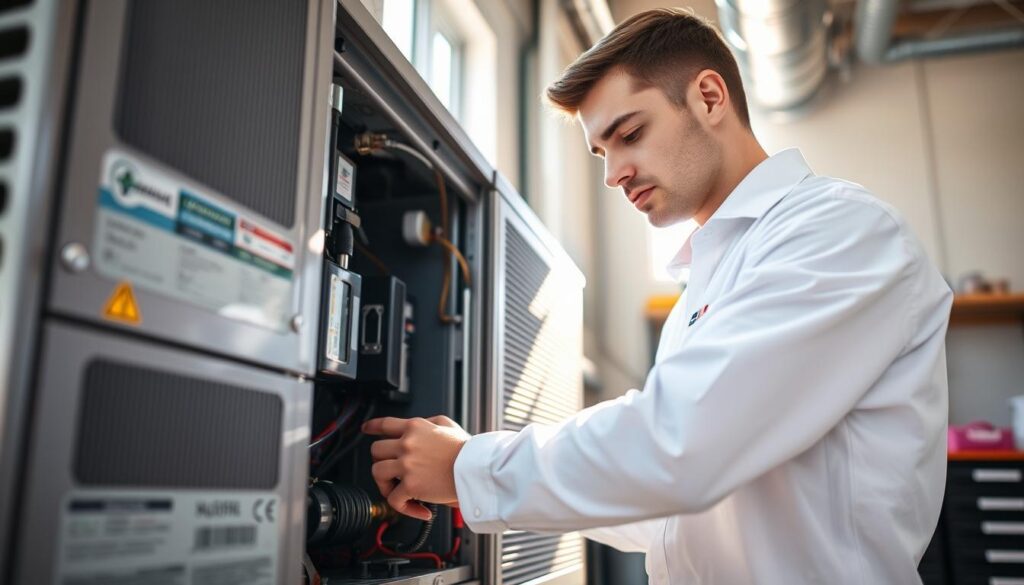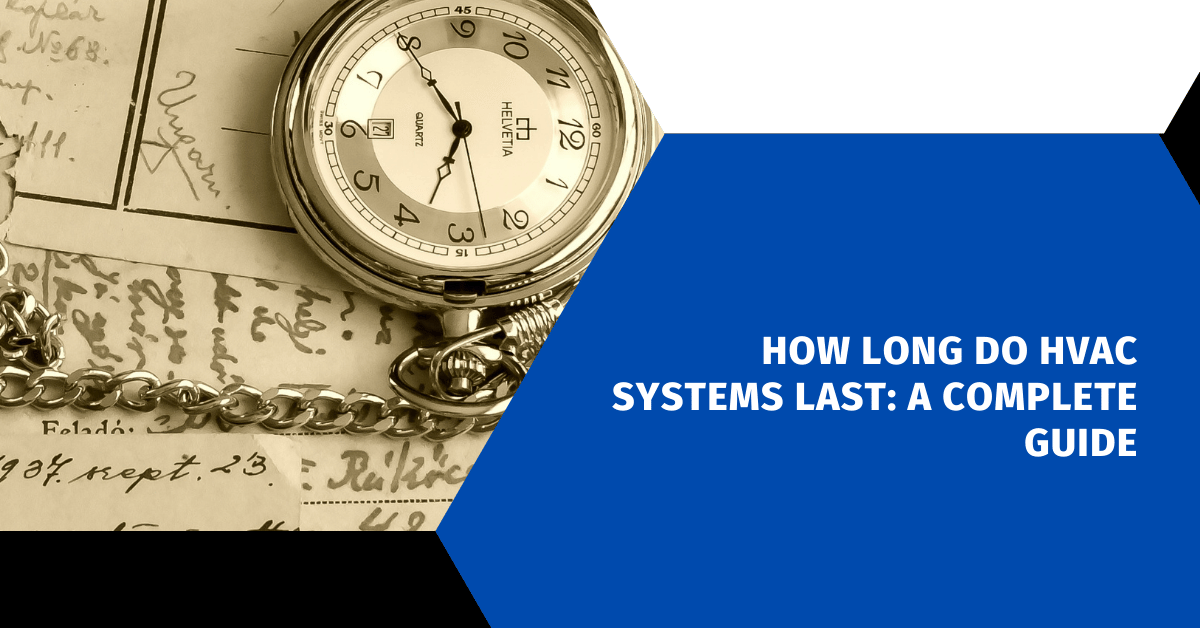How Long Do HVAC Systems Last? Ever wondered how long your HVAC system will keep your home comfy? Most homeowners are surprised. With the right care, their HVAC system can last longer than many home appliances.
Knowing how long HVAC systems last is key for comfort and saving on maintenance costs. While they usually last 15 to 20 years, several factors can affect their lifespan.

Modern HVAC tech has changed home comfort, making systems more efficient and durable. Learning how to extend your system’s life can save you thousands. It also ensures your home stays at the perfect temperature.
Key Takeaways
- HVAC systems typically last 15-20 years with proper maintenance
- Regular professional servicing extends system life
- Climate and usage patterns impact HVAC longevity
- Annual maintenance can prevent premature system failure
- Signs of system inefficiency indicate possible replacement needs
Table of Contents
Understanding HVAC Systems and Their Components
HVAC systems are complex networks that keep your home comfortable all year. Knowing how they work can help you make them last longer and use less energy.
Modern HVAC technologies have changed how we enjoy our homes. They offer energy-saving systems that work better and last longer. These systems are designed for different homes and businesses.
Different Types of HVAC Systems
Your home might have several HVAC systems. Each one has its own special features:
- Central air conditioning units
- Heat pumps
- Ductless mini-split systems
- Geothermal heat pumps
- Furnaces
- Boilers
Key Components and Their Functions
Every HVAC system has important parts that work together:
- Compressor: Moves refrigerant and heat
- Condenser: Takes in or gives out heat
- Evaporator: Cools air by taking in heat
- Air handler: Moves cooled air around your home
The Importance of Modern HVAC Technology
Today’s HVAC systems focus on saving energy and using smart tech. Features like programmable thermostats and zone control help systems work better. They also use less energy and make your HVAC last longer.
Getting a modern, energy-saving HVAC system is more than just comfort. It’s about saving money and being kind to the planet.
Average Lifespan of Different HVAC Units
Knowing how long different HVAC units last is key to planning when you’ll need a new one. Each system’s lifespan varies based on factors like upkeep, how often you use it, and where you live.
Let’s look at the usual lifespans of common HVAC systems:
- Furnaces: 15-20 years with regular care
- Air Conditioners: 12-17 years
- Heat Pumps: 10-20 years
- Boilers: 20-35 years
Your timeline for replacing your HVAC can change a lot based on how well you take care of it. Keeping up with maintenance is key to making your system last longer.
| HVAC Unit Type | Average Lifespan | Maintenance Impact |
|---|---|---|
| Gas Furnaces | 20-30 years | High with annual servicing |
| Central Air Conditioning | 15-20 years | Moderate with regular care |
| Heat Pumps | 10-20 years | Significant with bi-annual checks |
Living near the coast can make your HVAC system last much less time, often just 7-12 years. Your location, how much you use it, and how well you maintain it all affect when you’ll need a new one.
Explore Our HVAC Shop
Looking for top-rated HVAC tools, parts, and accessories? Visit our shop and find the perfect solution for your needs.
Visit the ShopHow Long Do HVAC Systems Last: Key Factors Affecting Lifespan
Your HVAC system’s life depends on many important factors. These factors affect its performance and how long it lasts. Knowing these helps you make better choices about upkeep, fixes, and when to replace it.
The life of an HVAC system isn’t just about time. It’s about how well it works in different conditions. Let’s look at what affects your system’s life at home.
Climate and Weather Conditions
Weather and climate are big players in how long your HVAC lasts. Extreme temperatures and harsh weather can make it wear out faster. For example:
- Places with very hot or cold weather stress HVAC systems more
- Areas with a lot of humidity can cause more corrosion and wear
- Coastal areas with salt in the air can make equipment break down faster
Usage Patterns and System Strain
How you use your HVAC system affects its life. Running it a lot or setting it too high can make it age faster. Here are some points to think about:
- Running it all the time can wear it down
- Big changes in temperature can stress parts
- Using the thermostat right can help avoid extra wear
HVAC Installation Quality Impact
The quality of your HVAC installation is key to its life. A good installation means:
- The right size for your space
- Equipment set up correctly
- Best airflow and efficiency
Bad installation can cut your system’s life by up to 50%. So, getting it done right is very important.
Choosing quality installation and regular care can make your HVAC last 15-20 years or more.
Signs Your HVAC System Needs Replacement
Knowing when to replace your HVAC system can prevent sudden breakdowns and expensive fixes. The timeline for replacing your HVAC isn’t always clear. But, there are important signs that can guide your decision.
Your HVAC system gives clear signs when it’s nearing the end of its life. Here are key warning signs that suggest it might be time for a new one:
- Frequent Repairs: Spending over $500 a year on repairs might mean it’s cheaper to replace
- Age of System: Most HVAC systems last 10-15 years before they start to decline
- Rising Energy Bills: Older systems can use up to 30% more energy
- Inconsistent Temperatures: If your heating or cooling isn’t even, it could be a sign of failure
Other signs include strange noises, odd smells, and poor air quality. These often mean deeper problems that might need a full system replacement.
| Warning Sign | Potential Issue | Recommended Action |
|---|---|---|
| Loud Operational Noises | Mechanical Wear | Professional Inspection |
| Persistent Humidity Problems | System Inefficiency | Consider Replacement |
| Refrigerant Leaks | Potential System Failure | Immediate Evaluation |
Deciding to replace your HVAC system early can prevent sudden failures. It also improves your home’s comfort and energy use.
Essential Maintenance Tips to Extend HVAC Life
Keeping your HVAC system in good shape is key to its long life and best performance. Regular maintenance can make your heating and cooling last longer. This could save you a lot of money on new equipment costs.
Ignoring your HVAC can make it work less efficiently and not last as long. Experts say it’s better to take care of it before problems start.
Regular Filter Changes
Changing your air filters often is a simple but powerful way to keep your system running well. Here’s why it’s important:
- Filters should be changed every 1-3 months
- Improves system efficiency by 5% to 15%
- Reduces strain on HVAC components
- Prevents dust and debris buildup
Professional Service Schedules
Getting your HVAC checked by a pro once a year can make a big difference. Technicians can:
- Detect problems early
- Clean important parts
- Check refrigerant levels
- Adjust system controls
Seasonal Maintenance Checklist
Make a detailed maintenance plan that changes with the seasons. Important tasks include:
- Spring: Clean outdoor condenser unit
- Summer: Check refrigerant levels
- Fall: Inspect heating system
- Winter: Seal air leaks
Regular maintenance can prevent up to 95% of unexpected HVAC breakdowns and extend system life by up to 50%.
Explore Our HVAC Shop
Looking for top-rated HVAC tools, parts, and accessories? Visit our shop and find the perfect solution for your needs.
Visit the ShopCost Considerations: Repair vs. Replace

Choosing between fixing or replacing your HVAC system is tough. The “$5,000 rule” helps guide this choice. If your system’s age times the repair cost is over $5,000, it might be time for a new one.
When looking at hvac repair costs, keep these points in mind:
- System age (usually 10-15 years)
- How often it breaks down
- Its energy efficiency ratings
- The cost of recent repairs
Thinking about the hvac replacement timeline is wise if your system often needs fixing. Energy savings are key. A new system with better SEER ratings can cut energy use by more than 35%.
Money matters a lot. A new HVAC system costs between $5,000 and $12,500. But, tax credits and rebates can help lower these costs. The Inflation Reduction Act of 2022 gives a 30% tax credit, up to $2,000, for efficient systems.
Pro tip: If your system needs repairs more than once a year, getting a new one is usually cheaper in the long run.
Choosing the right time to replace can bring big benefits. You’ll see better energy use, lower upkeep costs, and more comfort at home.
Modern HVAC Innovations and Efficiency Standards
The world of heating, ventilation, and air conditioning is changing fast. New energy-efficient HVAC systems are coming out. They bring exciting changes to how we think about comfort and the environment.
Today’s HVAC systems work better and use less energy. Your home can get smarter and more efficient with the latest upgrades. These upgrades offer smart features and better performance.
Energy-Efficient Technologies
New HVAC systems use amazing technologies to save a lot of energy:
- Variable-speed compressors that adjust output precisely
- Advanced heat exchangers with enhanced thermal performance
- Zoning systems for targeted temperature control
Smart HVAC Features
Smart technologies are changing how we control our homes’ climate. They bring new features:
- Wi-Fi connected learning thermostats
- Predictive maintenance monitoring
- Mobile app-controlled systems
Environmental Impact Considerations
| Technology | Energy Savings | Environmental Benefit |
|---|---|---|
| Geothermal Systems | Up to 400% efficiency | Minimal carbon footprint |
| Solar-Assisted HVAC | 50-70% reduction in electricity | Renewable energy integration |
| Eco-Friendly Refrigerants | Reduced global warming impact | Lower environmental impact |
Choosing energy-efficient HVAC systems makes your home more comfortable. It also helps the planet. The newest upgrades are smart ways to control your home’s climate while saving energy.
Explore Our HVAC Shop
Looking for top-rated HVAC tools, parts, and accessories? Visit our shop and find the perfect solution for your needs.
Visit the ShopProfessional Installation and Its Impact on Longevity

Your HVAC system’s performance and longevity depend a lot on its initial installation. Professional installation is not just a luxury. It’s a key investment in your home’s comfort and efficiency.
Choosing a qualified HVAC installer can extend your system’s life from 10 to 20 years. Poor installation can lead to many problems. These issues can harm your system’s performance and lifespan.
- Incorrect system sizing reduces efficiency
- Poor ductwork design increases energy consumption
- Improper calibration causes unnecessary strain
- Inadequate electrical connections create safety risks
When picking an HVAC professional, look for specific credentials. These show their expertise:
- NATE (North American Technician Excellence) certification
- State-issued professional licenses
- Manufacturer-specific training credentials
- Positive customer reviews and references
A professionally installed HVAC system can reduce energy bills by up to 30%. It also prevents unexpected breakdowns. Experts know the details of proper installation, like precise measurements and optimal refrigerant charging.
“A well-installed HVAC system is your first line of defense against inefficiency and premature system failure.”
Investing in professional HVAC installation quality means your system works at its best. It provides reliable comfort and saves on long-term maintenance costs.
Regional Factors Affecting HVAC Durability
Your HVAC system’s lifespan changes a lot based on where you live. The climate where you are affects how well your system works. In coastal areas, salt air can shorten air conditioner lifespans by 5% to 15%. Dusty places might cut system performance by 15%.
Different climates pose unique challenges for HVAC systems. Cold areas can shorten system life by 10% to 20% because of harsh conditions. In humid places like Washington DC, HVAC systems might need to be replaced every 10 to 15 years without upkeep. Systems made for specific environments can last up to 25% longer.
Local energy costs and how well your system is installed also matter. Good installation can boost system efficiency by 20%, extending its life. In the Midwest, HVAC systems usually last 16 to 20 years. But, coastal areas face more extreme weather, leading to shorter system lifespans.
Knowing your local climate is essential for better HVAC system performance. Regular maintenance, professional checks, and the right equipment for your area can improve your system’s lifespan and efficiency. This is true no matter where you are in the United States.

